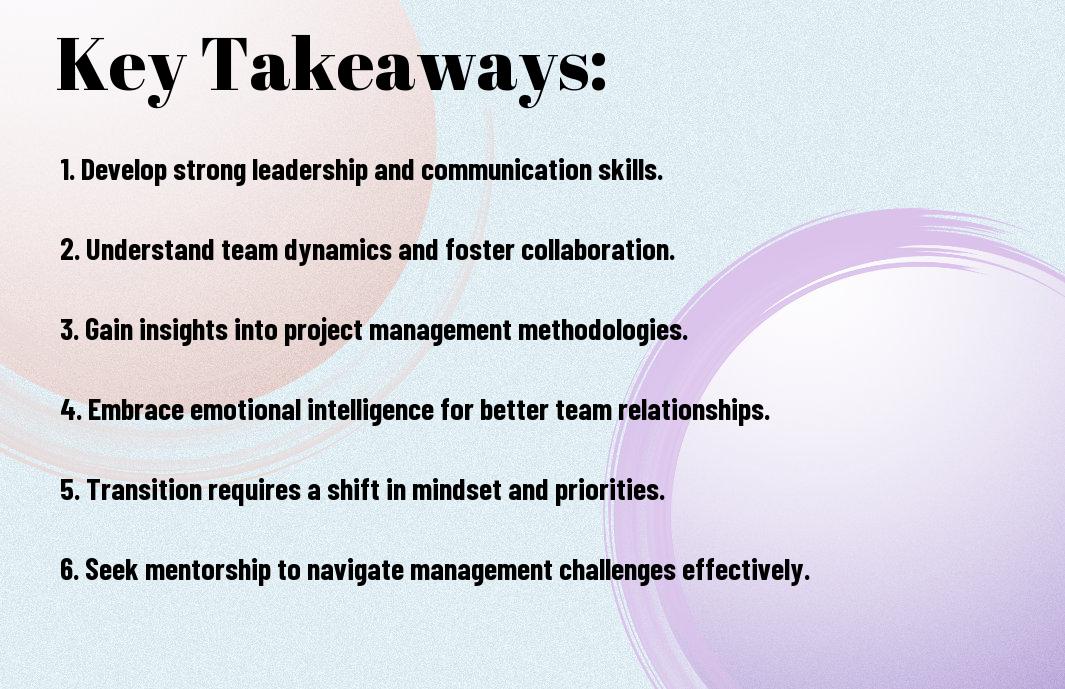Transitions in your career can be both exciting and challenging, especially when moving from the role of a software engineer to a management position. This shift requires not only a different skill set but also a unique mindset. You will need to develop leadership qualities, enhance your communication abilities, and understand the complexities of team dynamics. While the journey may include uncertainties and adjustments, it also offers tremendous opportunities for personal and professional growth. Embracing this change will enable you to shape future technology projects and inspire your colleagues.
Key Takeaways:
- Transitioning from software engineering to management involves developing leadership skills, including effective communication, conflict resolution, and team motivation.
- Understanding the broader business context is necessary; tech managers must align their teams’ work with the company’s strategic goals and foster collaboration across departments.
- Seek mentorship and networking opportunities; learning from experienced leaders in tech can provide valuable insights and guidance as you navigate your new role.
Understanding the Role of Management in Tech
Your journey from software engineering to management requires a deep understanding of the various responsibilities that come with a managerial role. In tech, management isn’t just about overseeing a team’s workflow; it’s about fostering an environment where creativity and innovation can flourish. As a manager, you’ll be responsible for aligning your team’s objectives with the company’s goals, navigating the complexities of interpersonal dynamics, and ensuring that projects are delivered on time and within budget. The ability to shift your perspective from a technical focus to a broader business outlook is imperative. For further insight into this significant transition, consider exploring the article Software Engineering to Management: What got you here ….
Differences Between Engineering and Management
Around the cornerstone of engineering lies a focus on technical problem-solving, where success is typically quantified through code quality and project completion. However, once you step into management, the parameters shift significantly. Your effectiveness now hinges not only on the performance metrics previously relevant but also on a range of softer skills including communication, empathy, and strategic thinking. As a manager, your role transitions into one that requires a keen understanding of both your team and the organizational landscape. The more you adapt to this new perspective, the more equipped you’ll be to guide your team through challenges and obstacles.
Key Skills Required for Management Positions
About the skills necessary for a management role, you will find that soft skills often take precedence over technical prowess. Many engineering leaders discover they need to communicate effectively with team members and stakeholders, navigate conflicts with diplomacy, and inspire teams toward shared goals. Your ability to facilitate collaboration and motivate your team is vital in creating a productive work environment. Additionally, you should develop a strategic mindset that allows you to prioritize initiatives based on business needs and team capabilities.
Differences in skills are very telling of what you will need to succeed in management. While technical skills are foundational, they often take a backseat once you transition to managing people. You must now focus on developing a high emotional intelligence to effectively gauge your team’s motivations, lead change during challenging times, and foster a culture of accountability and growth. Strong decision-making skills will also become imperative as you’ll frequently be tasked with making tough choices that impact not just project outcomes, but team morale as well.
Assessing Personal Readiness for Transition
Some individuals may find the transition from software engineering to management a daunting yet exhilarating prospect. To ensure that you are well-prepared for this career change, it’s vital to engage in honest self-assessment. Begin by evaluating your current skill set and identifying the attributes necessary for a management role, such as excellent communication, leadership, and strategic thinking. Reflect on your professional experiences, strengths, and areas where you may need to grow. This assessment will not only help you understand if you are ready for the challenges ahead but also position you to set meaningful career goals aligned with your aspirations.
Self-Reflection and Career Goals
An effective method of self-assessment begins with introspection. Consider what aspects of management resonate most with you and how they align with your career objectives. You might envision leading teams, driving project outcomes, or contributing to company strategy. Define what success means to you and outline attainable short- and long-term goals to guide your transition. Setting relevant goals will provide both direction and motivation as you navigate the complexities of management.
Seeking Feedback from Peers and Mentors
By engaging with your peers and mentors, you can gain valuable insights into your readiness for a management role. Discuss your aspirations with individuals who understand your work ethic and capabilities. Their feedback can illuminate your strengths as well as areas that may require improvement. This external validation serves as a foundation for your transition process, enabling you to make informed decisions about your capabilities.
Readiness for a transition to management often hinges on the perspectives of those around you. Their insights can reveal hidden strengths and developmental needs that might not be obvious in your self-reflection. Furthermore, engaging with mentors can expose you to real-world scenarios in management, highlighting both the challenges and rewards. Take note of constructive criticism that may seem uncomfortable at first; such feedback often presents an opportunity for growth. Surround yourself with supportive individuals who believe in your potential and can guide you through the maze of career transition.

Acquiring Necessary Skills and Knowledge
After making the decision to transition from software engineering to a management role, assessing and acquiring the necessary skills and knowledge becomes imperative. You will find that stepping into management requires a different skill set compared to technical expertise. To be successful, you need to embrace a growth mindset and actively seek education and training that will equip you with the right tools for leadership, communication, and strategic planning.
Formal Education and Training
Acquiring formal education and training can significantly enhance your managerial capabilities. You might consider pursuing an MBA or taking specific management courses that cover vital topics such as organizational behavior, team dynamics, and project management. These programs often provide frameworks for understanding complex business challenges and can enhance your analytical skills. Additionally, workshops focused on leadership development can offer insights into how to motivate teams and manage workforces effectively.
On-the-Job Learning and Experience
By immersing yourself in on-the-job learning and experience, you build a wealth of practical knowledge that can complement formal education. Take the initiative to seek out mentorship opportunities within your organization, shadow experienced managers, and participate in cross-functional projects. Such engagements can expose you to different aspects of management and provide a clearer understanding of how various departments operate. The hands-on experience will help you develop the soft skills needed to navigate workplace dynamics, such as conflict resolution and effective communication.
In fact, engaging in on-the-job learning allows you to understand the nuances of team management directly. You are likely to discover best practices and potential pitfalls in real-time, enabling you to adapt your approach along the way. Actively participating in team meetings, offering constructive feedback, and volunteering for leadership roles in small projects are just a few examples of how you can enhance your managerial skills. This experiential learning is an enriching process that equips you with practical insights and prepares you for the challenges you will face as a manager.
Building a Professional Network
Once again, the significance of a robust professional network cannot be underestimated, especially during your transition from software engineering to management. Establishing connections with peers, mentors, and industry leaders can provide you with valuable insights, guidance, and support as you navigate this shift in your career path. By fostering relationships within the tech community, you position yourself to tap into resources and advice that can elevate your leadership skills and enhance your understanding of management dynamics.
Importance of Networking in Tech
Across the tech industry, networking serves as a catalyst for professional development and opens doors to new opportunities. Engaging with fellow professionals enables you to stay informed about emerging trends, technologies, and methodologies that can augment your managerial prowess. Moreover, the connections you cultivate can lead to collaborations that not only enhance your visibility but also bolster your credibility as a leader in your field.
Leveraging Connections for Career Opportunities
Along your journey, leveraging your connections can significantly impact your career trajectory. When seeking management roles, the insights and recommendations from trusted contacts can be invaluable in gaining access to job openings and interviews that may not be advertised publicly. Your network can provide referrals that validate your skills and background, making you a more attractive candidate to potential employers.
But building effective connections goes beyond simply accumulating contacts; it requires active engagement and mutual support. Participating in industry events, joining professional organizations, and reaching out to individuals whose work you admire can strengthen these relationships. Maintaining a presence on platforms like LinkedIn allows you to stay top of mind and share your experience, showcasing your skills and aspirations. Ultimately, leveraging your network not only amplifies your chances of securing management opportunities but also builds a foundation of trust and collaboration that can benefit your long-term career growth.
Navigating the Job Search Process
To successfully transition from software engineering to a management role, you need to approach the job search process with a strategy tailored specifically to management positions. This involves redefining your goals, identifying relevant companies, and networking with industry professionals who can provide insights and guidance. Understanding the landscape of management roles in tech is important, as you’ll need to highlight abilities that resonate with hiring managers looking for leaders who can motivate teams and drive project success.
Tailoring Your Resume for Management Roles
Your resume should shift focus from technical skills to those that reflect your leadership capabilities and strategic thinking. Start by emphasizing experiences where you led projects, mentored colleagues, or contributed to decision-making processes. Use action verbs and quantifiable achievements to showcase how your leadership has positively impacted your team or organization. Additionally, consider incorporating soft skills vital for management, such as communication, conflict resolution, and team building, as these will help paint a picture of your potential as a manager.
Preparing for Interviews in a Management Context
Before stepping into an interview, it’s important to prepare thoroughly for potential questions that reflect your managerial skills rather than just your technical expertise. Familiarize yourself with behavioral interview techniques, as many employers will assess your past experiences to predict your future performance in management. Prepare to discuss scenarios where you successfully managed conflict, fostered collaboration among team members, or drove a project to completion, focusing on your approach, the challenges you faced, and the outcomes achieved.
Considering management interviews often research into your ability to lead, you should anticipate questions that gauge your leadership philosophy and style. Be ready to discuss how you have fostered team collaboration, dealt with underperformance, and promoted innovation within your teams. This insight not only helps interviewers assess your fit for the role but also allows you to differentiate yourself by showcasing a deep understanding of the managerial responsibilities involved in a tech setting.
Overcoming Challenges in the Transition
All transitions come with their own set of challenges, and moving from software engineering to management is no exception. As you step into a role that requires a different skill set and mindset, you may find yourself faced with new responsibilities, expectations, and the pressure to perform. By understanding the potential roadblocks and proactively seeking solutions, you can navigate this transitional phase smoothly and effectively.
Addressing Imposter Syndrome
Below the surface of a management role may lurk feelings of self-doubt and inadequacy, often referred to as imposter syndrome. It’s common to feel unqualified or question your ability to lead despite your accomplishments in engineering. Acknowledge these feelings, as they are part of the journey. Instead of letting them undermine your confidence, adopt a growth mindset. Emphasize continuous learning and seek feedback from others. This approach can empower you to recognize your value and potential contributions to your team.
Managing Team Dynamics and Relationships
With your new role, understanding team dynamics is necessary to foster a positive work environment. You will find that leading a team differs significantly from technical work; the interpersonal relationships and interactions can be quite complex. Invest time in understanding each member’s strengths, weaknesses, and motivations. Regular check-ins and open communication channels will help you build credible relationships, allowing your team to feel appreciated and heard.
Also, your role in managing team dynamics entails facilitating collaboration and resolving conflicts effectively. Recognize that each member of your team brings unique perspectives and experiences that can enhance problem-solving. Encourage open dialogue and create a culture of trust where team members feel comfortable expressing their ideas and concerns. This not only boosts morale but also enhances productivity, resulting in a more cohesive team effort toward achieving your organization’s goals.

To wrap up
So, as you consider making the transition from software engineering to management, it’s important to reflect on both your technical skills and your leadership capabilities. This shift requires you to embrace a broader perspective where collaboration, communication, and strategic thinking become key components of your daily responsibilities. You’ll need to adapt your problem-solving skills to address team dynamics and project management, while also fostering an environment that encourages innovation and growth among your colleagues.
Additionally, seeking mentorship and feedback can enhance your understanding of management principles. Engaging with experienced leaders can provide you with insights into effective team dynamics, conflict resolution, and decision-making processes. As you make this transition, focus on developing your soft skills while leveraging your technical expertise, ensuring you’re well-equipped to guide your team towards shared goals. Embrace the journey ahead as an opportunity for your professional growth and contribution to the tech field.
Q: What are the key skills required to transition from software engineering to a management role in tech?
A: Transitioning from a technical role to management requires a blend of soft and hard skills. Key skills include leadership abilities to inspire and guide teams, effective communication to articulate ideas and provide feedback, project management to oversee timelines and deliverables, and strategic thinking to align technical initiatives with business goals. Additionally, emotional intelligence is crucial to manage team dynamics and foster a positive work environment. Gaining experience in mentoring or leading small projects can also help in making this transition smoother.
Q: What challenges might someone face when moving from a technical role to a management role in the tech industry?
A: Individuals transitioning to management from a technical background may face several challenges. One common issue is the shift in focus from individual contributions to team performance, which can be a difficult adjustment. Additionally, navigating office politics and understanding organizational dynamics may require new skills that weren’t as prominent in a technical role. There’s also the risk of imposter syndrome, where a person may feel unqualified for the new responsibilities. Seeking mentorship and participating in leadership training can be beneficial in overcoming these obstacles.
Q: How can someone prepare for a managerial role while still working as a software engineer?
A: To prepare for a managerial role while in a software engineering position, consider seeking opportunities to lead projects or initiatives within your team. This allows you to practice management skills in a controlled environment. Engaging in professional development by attending workshops or pursuing certifications in management or leadership can also be valuable. Networking with current managers or joining industry groups focused on leadership can provide insights and advice. Regularly asking for feedback on your communication and leadership style can also guide your growth.
